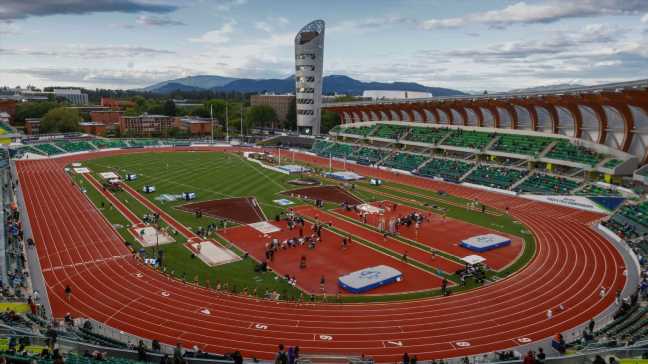World Athletics has banned transgender women from competing in elite female competitions if they have gone through male puberty, the sport’s governing body said Thursday.
Organization president Sebastian Coe said at a news conference that the decision by the World Athletics Council to exclude transgender women was based “on the overarching need to protect the female category.”
Coe added that World Athletics would form a task force to study transgender inclusion that would be chaired by a transgender athlete.
Also on Thursday, World Athletics voted to end its eight-year doping ban for the Russian Athletics Federation, but the country’s athletes, and those of Belarus, will remain excluded from international competition because of an ongoing separate ban over the invasion of Ukraine.
The World Athletics Council kept its ban on Russian athletes in international events in place “for the foreseeable future” — a move that goes against the International Olympic Committee’s efforts to find a way for Russian athletes to compete as neutrals in upcoming events.
The council also voted to tighten restrictions on athletes with differences in sex development, cutting the maximum amount of plasma testosterone for athletes in half to 2.5 nanomoles per liter.
The tighter testosterone rules will affect athletes such as two-time Olympic 800-meter champion Caster Semenya, Christine Mboma, the reigning Olympic silver medalist in the 200 meters, and Francine Niyonsaba, who finished runner-up to Semenya in the 800 at the 2016 Olympics.
World Aquatics, swimming’s world governing body, voted in June, with 71% of the national federations in favor, to bar transgender women from elite competition if they had experienced any part of male puberty. A scientific panel had found that, even after reducing their testosterone levels through medication, transgender women still had a significant advantage.
World Athletics regulations around differences in sex development previously required women competing in events between 400 meters and a mile to maintain testosterone levels below five nanomoles per liter.
At the Tokyo Olympics, South Africa’s Semenya and Burundi’s Niyonsaba were both barred from the 800 meters and turned their attention to the 5,000. Semenya failed to qualify for the Games while Niyonsaba made the final before being disqualified for a lane violation. Namibia’s Mboma, prevented from running the 400 meters, switched to the 200 meters and won silver.
Russia’s ban began in late 2015 after the discovery of massive, state-sponsored doping and related cover-ups. The suspension remained in place following a failure to meaningfully address the issue.
However, Rune Andersen, head of World Athletics’ Russia Task Force, reported that he was finally satisfied with the “new culture of good governance and zero tolerance for doping throughout the organization.”
“An independent audit team confirms that RusAF has met all the detailed KPIs and other requirements set out in the reinstatement plan,” Andersen said in a news conference. “I advised Council today that those conditions have now been met. RusAF has accepted a detailed set of post reinstatement conditions designed to ensure there is no backsliding from the significant progress.”
Andersen warned, however, that he was unsure whether the change in approach would be permanent and recommended the suspension be imposed again in the case of any failure to meet the reinstatement conditions.
In recent years, dozens of Russian athletes had been allowed to compete as neutrals if they could show a doping-free background, but they too remain unable to compete after the council voted to maintain the blanket ban on Russian and Belarusian athletes.
The decision follows last week’s ruling by the European Athletics Council that Russian and Belarusian athletes should remain banned from its events until the war in Ukraine ends.
Reuters and The Associated Press contributed to this report.
Source: Read Full Article

